"Search Engine Journal" - 7 new articles
Google to Launch New Voice Desktop AppWhen Google acquires Gizmo5, a VoIP service that provides P2P VoIP calls and calls with normal landlines and mobile phones, it wasn’t clear as to how Google will possibly use Gizmo5’s technology. Although, Gizmo5 could very well provide Google Voice an endpoint for calls, Google didn’t do much to make this happen, until now.According to TechCrunch, Google is currently testing a new Google Voice desktop application built on the Gizmo5 technology. This application will finally allow users to make and receive calls from their desktop without needing to attach their Google Voice account to an existing phone number. The said app is currently under Google’s “dogfooding” system, meaning it is currently being tested by Google employees themselves before putting it out for public beta testing soon. How soon? In a weeks or so perhaps since Google has started testing the app this week. Check out the SEO Tools guide at Search Engine Journal. Google to Launch New Voice Desktop App Search Ads Top Record High of $6.3 Billion Ad Spending in Q4 '09The Interactive Advertising Bureau and Price Waterhouse Coppers’s IAB Internet Advertising Revenue Report for 2009 is showing some quite interesting findings regarding the comparison of online ad spends and search spending.Search Ads topped the spending over the past year, comparing Q4 2008 & Q4 2009. According to the report search advertising revenue grew slightly from 45% in 2008 to 47% in 2009. This is despite the fact the overall U.S. internet advertising revenue went down 3.4% at $22.7 billion in 2009 (but again, increased in Q4). In a nutshell, search rules! 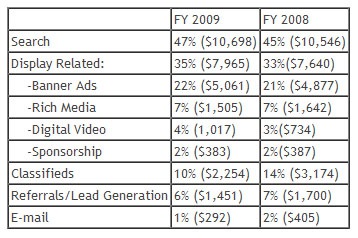 So, while overall spending decreased, online search & display ad spends increased :) Thanks to an upsurge in spending during Q4 2009 (a good sign), the overall increase in internet ad revenue increased. If the recent couple of months are any sign, this increase is not ending anytime soon. I do not know about every particular search marketing firm or consultant, but we are busier than ever and the end does not look like it’s in sight! Other interesting findings of the IAB report:
Search Ads Top Record High of $6.3 Billion Ad Spending in Q4 '09 Google Adds Buzz to Maps for Mobile App for BlackBerryFor a long time now, I’ve been trying to use Google Buzz on my Nexus One Maps App but to no avail. For some reason I can’t get it to work. So, I was quite surprised how easy it was to activate Google Buzz on the Maps for Mobile 4.0 app for my BlackBerry Bold 9700. This came after Google updated its Maps for Mobile App for Blackberry devices to version 4.0. And together with Google Buzz, Google has also added some other cool features to the app.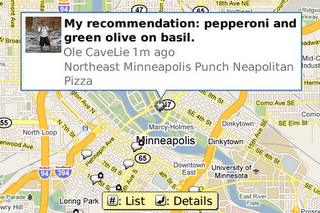 To use Google Buzz on Google Maps for BlackBerry, simply fire up the app, select Layers > Buzz. You can then start posting location updates to your Google Buzz account. It’s a pretty cool application. Something that could compete with Foursquare and other location-based social networking apps. 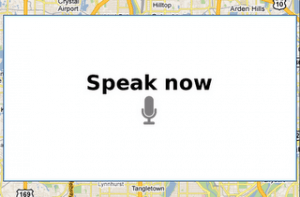 Google also added search by voice to Maps for BlackBerry. While the Map apps’ main menu is open simply press and hold the green “call” button on your BlackBerry device, and start speaking your search. The app lets you search for establishment’s name, addresses and generic search keywords. Google also added search by voice to Maps for BlackBerry. While the Map apps’ main menu is open simply press and hold the green “call” button on your BlackBerry device, and start speaking your search. The app lets you search for establishment’s name, addresses and generic search keywords.Other useful features of Google Maps 4.0 for BlackBerry include – search suggestion, starring of places you’ve visited and syncronization with your dekstop Google maps, Mobile Labs, and the facility for viewing nearby places. To get Google Maps for BlackBerry, simply point your device’s browser to m.google.com/maps, download and install the app from there. Check out the SEO Tools guide at Search Engine Journal. Google Adds Buzz to Maps for Mobile App for BlackBerry Google Gets a Lawsuit from PhotographersHere’s another twist on Google’s long struggle on the Google Book Search Settlement issue. The American Society of Media Photograpehrs (ASMP) and other photographic artists groups and concerned individuals have filed a class action copyright infringement lawsuit against Google. Their case? – Google’s alleged copyright infringement on the photos contained on the scanned millions of books under the Google Books Search problem.By scanning the whole volume of books and making it available for public consumptio, Google is infringing on the copyright of the individual photos contained in those books, the group argues. This may seem pretty logical since Google did not obtain permission to reproduce those photographic works from the original creators. Although, it may seem legal as well if Google has obtained permission from the book publisher since the photos are part of the whole book scanned. Interestingly, the lawsuit was filed on April 7 in the U.S. District for the Souther District of New York. This is also where the Google Book Search settlement was filed. According to ASMP, the lawsuit covers Google’s systematic and pervasive infringements of the photographers, illustrators and other visual artists rights. Now, should the Google Book Search settlement which is scheduled to be resolved anytime soon in favor of Google, what will happen to this lawsuit filed by the photographers’ group then? The lawsuits are different entities so, ruling for one will not carry over as a ruling for the other. But the ultimate issue of course is whether Google will be given the go signal to continue with the Book Search project. Check out the SEO Tools guide at Search Engine Journal. Google Gets a Lawsuit from Photographers A Holistic Approach to PPCPaid search is hot. Well, it’s been hot for a while — at least the past 5 years. And it continues to grow: according to eMarketer, search spending will reach $11,422 million this year. But with all this growth and attention on the click, most conversations on PPC start and end there — from bids, to ads, to keywords and more — without any mention of how to convert the click.But if you think about it, the click is really just the first part of search marketing — the first phase. The goal of most search campaigns is actually the conversion — the second phase. The click is the yin; the conversion the yang. Search marketing really deserves a holistic approach — one that combines the two goals of search marketing — getting the click and converting it. Instead of just launching your ads and optimizing your clicks, take a holistic approach to PPC and follow through on your paid clicks by optimizing landing pages. Here are 5 ways to develop a holistic approach to search marketing in your online marketing: 1. Develop collaboration between search & conversion experts. Assuming you are optimizing your landing pages, it’s essential that the person in charge of your landing pages (whether an outside vendor, or someone on your team) openly collaborates and works with the person in charge of your search campaigns. 2. Match agility of search with agility of conversion. The most exciting part of search marketing is it’s agility — you can launch & update your keywords and ads in real-time! Have an idea? Simply log-in, add some keywords, create an ad, and you’re done — well, not really. When you take a holistic approach to PPC, you must match the agility of search with the agility of your landing pages. When you create and edit your keywords & ads, you must follow through and optimize your landing pages with that same velocity. 3. Prioritize conversion within your organization. To take a holistic approach to PPC, you must prioritize conversion optimization within your organization — that way you can be sure nothing (IT, design, schedules etc.) gets in the way of you creating and updating your landing page. 4. Follow through to the landing page when developing search strategies. When developing your search strategies, make sure you include the landing page test (a nice A/B test) that should be included with each ad, inclusive of its messaging and call-to-action. 5. Illuminate landing pages when reporting search metrics. When reporting on search metrics, include important key metrics of your landing pages, such as bounce rates, conversion rates, cost-per-acquisition, and overall engagement. That way, you can gauge the overall health of your landing pages in tandem with your PPC, and assess ares of concern and opportunity. Because it’s not all about the click — it’s how you convert it. Check out the SEO Tools guide at Search Engine Journal. A Holistic Approach to PPC How I'm Going To Pay For Obama's Health Insurance ReformI'm a huge fan of the Obama's health insurance reform bill. It's not that often that such a significant societal opportunity occurs that allows me to take decisive action to better my family's welfare both presently and for many years into the future.Do you think I'm getting political on you? Not at all…I'm talking about the rare opportunity to purchase relevant domain names at their registration fee which had no intrinsic value before health insurance reform but significant value after the bill became law.  How can I figure out which profitable domain names I should purchase? Well, I certainly don't have to read the 8 billion pages of the legislation. In fact, I don't even have to know much about health reform at all. All I need to do is be able to look at the news coverage and be able to perceive what might be a good choice for a (preferably dot com) domain name. So, let's take a look at a news article that talks about some of the changes in the new law…and my eyes are drawn to the following words: "The individual mandate does not go into effect until 2014 partly because it will take a long time to set up the state-run exchanges at which individuals and small-business employees will be able to comparison-shop for policies" State run health insurance exchanges in 50 states…50 obvious possible permutations of domain names…let's check availability, shall we? If you check "name of state + healthinsuranceexchange" for .com and .org, there isn't any availability…someone bought almost all of these names last year (and he is my domaining hero). However, if you check .net, you'll find significant availability (as of the time I am writing this). .net isn't as brandable as .com or .org, but if you're making an SEO play, those names will definitely work well for you. Not as brandable but good for SEO is healthinsuranceexchange + name of state. Plenty of .com and .org availability for these names (again as of the time I am writing this). A couple footnotes:
Check out the SEO Tools guide at Search Engine Journal. How I'm Going To Pay For Obama's Health Insurance Reform Put Your Content Copies Under ControlWe are all being copied. The moment any new article gets published, it is being republished on some crappy blog (more often than not, without any credit). There’s not much we can do about that.This post is about those content stealing that is done through direct copy-pasting from the page. This is just one way to steal your content but it is used pretty often. So how do we go about people copying our content? 1. Force a link back to your pageTracer is a free tool that forces a potential content thief to link back to your page. If any part of your page is copied, it adds a link back to your site to the copied content. Of course, the link might be manually removed but most thieves never care to.The installation is really quick:
 2. Allow to embed your content (instead of re-publishing it)EmbedArticle is an interesting service that invites anyone attempting to copy your content to use the generated code to embed the article (with the link back to the original). You can even configure the widget to show your ads in the embed article (to earn from that re-used content).Just insert the generated code (or use the Wordpress plugin) to get it working. The Embed Article widget window will pop open whenever more than 10 words (or whatever number you set) are highlighted and there is a copy command. 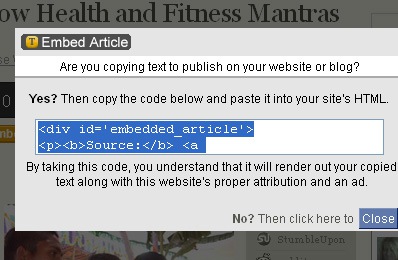 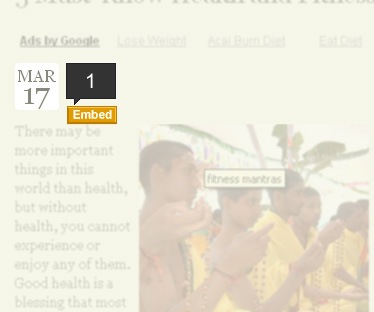 The site also offers basic stats on who embeds your content and how many clicks you get. Warning: please test thoroughly before running. For me, the plugin won’t work for some of my blogs. Not sure if that was the theme issue. 3. Forbid copying textThis method seems to be both extreme and low-effective (since it only forbids right-click but not CTRL+C copying) but it is still often used.WP-PreventCopyBlogs (by Johnu George) is a handy plugin that has quite a few options:
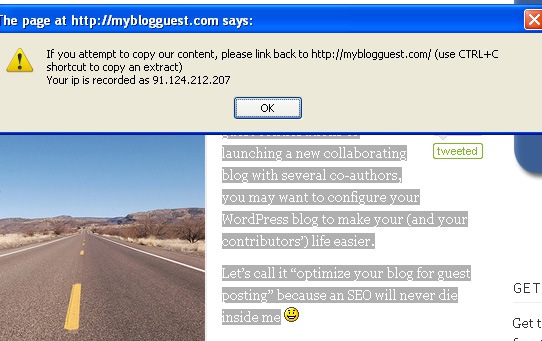 Put Your Content Copies Under Control More Recent Articles |
Click here to safely unsubscribe now from "Search Engine Journal" or change your subscription or subscribe
Unsubscribe from all current and future newsletters powered by FeedBlitz
| Your requested content delivery powered by FeedBlitz, LLC, 9 Thoreau Way, Sudbury, MA 01776, USA. +1.978.776.9498 |



